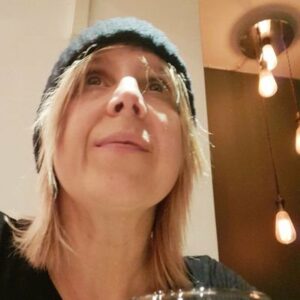
Part 2 MARK STATMAN: MEXICO AND THE POETRY OF GRIEF AND CELEBRATION
Part 2 of my interview with Mark Statman looks closely at Mark’s Latin American poetic influences, his life in Mexico and ends with an extract


I interviewed Sarah Hehir who scripts The Archers and BBC Doctors. As a past winner of the inaugural BBC Writer’s Prize, Sarah writes plays and scripts that highlight inequality, unheard voices and hidden stories. Her stage work has appeared in the Short Plays with Great Roles for Women anthology and at The Pleasance, Edinburgh Fringe Festival. Sarah is passionate about her poetry, which she reads in public and describes as her ‘first love’.
Leslie: Tell us about writing for radio. How do you ensure that scripts for The Archers are completely consistent with the show and the characters’ histories?
Sarah: Starting to write for The Archers at the very beginning of Covid was actually a gentle enough way in for a theatre writer. It meant, instead of a very complex process of managing multiple stories over six episodes a week, we were asked to write character monologues. Although there was controversy among the fans – lovers and haters – as a theatre writer, it was actually a pleasure to explore the inner thoughts of iconic characters for a while.
By the time things moved gradually towards normal, I felt established as a writer on the show and less intimidated by the massive responsibility of writing for some of the nation’s favourite characters.
The whole team works hard for consistency. Often the four writers in a particular month will email back and forth, sending scenes and updates to make sure nothing odd slips through. The main powerhouse of consistency is the vast archive and our brilliant archivists and agricultural advisors. I’ve learnt more than I thought I needed to know about cows’ insides.
Leslie: You also write for other shows that include a strand of social commentary. How do you research the issues you’re writing about and how do you ensure that they occur naturally within the storyline?
Sarah: Almost all of my writing is driven by a desire to tell stories that deal with inequalities in our society. These are the stories that matter and the ones that drive conflict and change. As long as the issue is rooted in the characters and their communities (their behaviours, choices, limitations, triumphs and failings) it’s easy enough to avoid writing in a didactic way. In terms of research, it can range from a Google search to an in-depth interview. Place is very important to me in my writing. For ‘The Shadow Garden’ my research has taken place over three years including visits to Manchester, Belgrade, Podujeve and Pristina. If I need to know how a combine harvester works, I watch an on-line video and hope I write about it well enough for the Archer’s agricultural editor to approve the script.
Leslie: How does writing for TV, and specifically BBC Doctors (but also Seafort and Snapcatch), differ from radio?
 Sarah: It’s an interesting question because I feel able to hop from radio to stage to TV without a problem. It’s when I try to write in prose that I suddenly struggle and the style feels stilted. Covid threw up limitations and challenges on both TV and radio in terms of simplified production, distancing, limited numbers and less action. I actually enjoy writing within certain limitations. We do that all the time as theatre writers because of budget constraints. What can feel initially annoying like three guest character limit, often makes a story tighter. It’s my job to be inventive in how the story is told and that’s all part of the creativity. I enjoy the fact Doctors has a story of the week which allows the scriptwriter a truly original voice: the show is extremely open about themes and story ideas as well as being pleasingly experimental at times.
Sarah: It’s an interesting question because I feel able to hop from radio to stage to TV without a problem. It’s when I try to write in prose that I suddenly struggle and the style feels stilted. Covid threw up limitations and challenges on both TV and radio in terms of simplified production, distancing, limited numbers and less action. I actually enjoy writing within certain limitations. We do that all the time as theatre writers because of budget constraints. What can feel initially annoying like three guest character limit, often makes a story tighter. It’s my job to be inventive in how the story is told and that’s all part of the creativity. I enjoy the fact Doctors has a story of the week which allows the scriptwriter a truly original voice: the show is extremely open about themes and story ideas as well as being pleasingly experimental at times.
Writing the short film Snapcatch was a pure joy. I worked with Sean Glynn and his team on their concept and produced a lyrical script that explored online abuse at the same time as playing with style and form to appeal to a teenage and young adult audience.
The Seafort and The Quarry are my favourite TV pilots: both original psychological thrillers written from the heart. This is the frustrating part of the industry – that these scripts have won competitions and places on schemes, got me general meetings with production companies and yet will probably never be made. Unless you are relentless in your networking or already well-connected, the key to getting in a writer’s room or being commissioned for an authored show remains a mystery. Every success in my writing life has resulted from me entering an opportunity or winning a competition. I think that highlights a problem with the industry, barriers to entry, existing networks and the role of gate-keepers. Once my daughters leave home, I might have to go down the grim route of relentless networking!
Leslie: Can you give us examples, in your collaborative and experimental writing for theatre, of how you researched and brought to life unheard voices and hidden stories?
Sarah: I’ve taught drama in schools and prisons for over twenty years and these are the spaces where much of the exciting, experimental work goes on and where unheard voices have a platform and some agency to tell their stories.
My first collaborative theatre writing commission came from Needlefoot, working with choreographer Deborah Galloway, Rambert dancers, schoolchildren and projectionist Gerred Blythe. It was kind of bonkers and wonderful. I wrote on the spot, creating material that turned into dancers, turned dances into dialogue and accompanied an octo-cycle on its journey through history.
My most recent work – The Shadow Garden resulted from a collaboration with The Bogujevci Family foundation and, with DYCP funding, became the basis for my development in writing through physical workshops playing with narrative and form. With Child Z (based on the Rochdale child grooming scandal) and this play (based on the massacre in 1999 in Podujeve, Kosovo and the resulting war crimes trial in Belgrade) the responsibility of telling a story that isn’t from my personal experience, means that in-depth research, consultation and reflection is vital: it has to be built into the process from start to finish.
Leslie: In writing for mainstream radio/TV programmes how, if at all, have you been able to challenge/change perceptions of women’s agency, behaviour, fields of expertise and power roles? How do you present those issues in your other writings?
Sarah: In all my writing, the role of women and the way they are perceived and treated in drama, is absolutely central. I am aware of my own ingrained stereotypes and the more overt and toxic attitudes in wider society and challenge both at every stage. It’s my responsibility to be better at representation. Interrogating what a character does, says and thinks generally makes for a more complex and dramatically interesting character.
Leslie: Can you give us examples, please, of the creative constraints you work under? Do you subtly self-edit, ‘push’ the boundaries, or have to accept externally-imposed changes? What have you learned from these situations?
Sarah: I think, being honest, I’ve done all of the above. I have a good relationship with my script editors in TV and radio which means that, where something matters to me creatively or in taking a moral stance, I have usually been taken seriously. However, there are compromises that need to be made and I try to be reasonable too. There was one project, potentially lucrative, that I said no to because there I felt very uncomfortable about how the subject was being addressed. It was good to be tested – to learn that the boundaries I have are real!
Leslie: Tell us about how you write poetry. Does it all come out quickly – gestate for a long time – get revised as it goes – develop from an idea, a dream or an experience? What mode of thinking are you using when you write poetry?

Sarah: Poetry is my first love. I write poems in a notebook and scribble on it a lot. Once I have an idea, I usually write pretty quickly – a stream of consciousness draft. It’s so refreshingly different from writing scripts. Sometimes I play with structure and impose constraints but usually it’s about how the language sounds and how best to get the idea across. I write a lot about love, the sea, sex and family: things that matter. Wild Garlic is a narrative poem I wrote for radio, requiring me to sit with my feet in a stream and eat wild garlic scones while writing ideas and drawing sketches. This was a lovely commission!
Leslie: How did childhood prepare you to care for/understand nature? How did issues of climate/ecology/social justice begin, grow and develop for you? How and where do you represent these concerns through your work?
Sarah: I grew up in a small village in North Lincolnshire. We grew vegetables in the garden and built dens in the woods. My mum worked on the farm and my dad was a shift chemist at Immingham Docks. There was a strange relationship between nature/farming and the environment at the time – I could name trees and birds and wild flowers but didn’t think to question stubble burning or pest spraying. Later on, when I was a teenager, our dad won The Queen’s Award to Industry for Services to the Environment. he worked for a fertiliser company so this was quite an achievement and also kick-started my questions into the environment and our responsibility to protect it beyond our own community.
My interest in social justice grew from my parents talking to me, from TV, books, my wonderfully radical first English teacher, moving to Manchester and eventually working at Abraham Moss High School in a truly diverse community and from gradually seeing that the world wasn’t equal and getting angry about it. In all my work – in writing and in education – I feel driven to expose hypocrisy and to fight for something better. Sometimes this is in small ways – sometimes much more overtly. More than ever, I’m thankful that I am a writer and a teacher and furious that platforms are still largely taken up by those born with money and privilege. I hope we can all work together in the creative industries to shake things up and create sustainable, supportive ways to include voices from all kinds of backgrounds and communities.
Next week I interview author and eco-educationalist Sarah Watkins, who writes books about young children playing outdoors for wellbeing.
ABOUT LESLIE TATE’S BOOKS:

Part 2 of my interview with Mark Statman looks closely at Mark’s Latin American poetic influences, his life in Mexico and ends with an extract

I interviewed international poet and translator Mark Statman about Volverse/Volver, his 14th published collection. Mark, who has won national arts awards, is Emeritus Professor of Literary

I interviewed Lisa Dart, finalist in the Grolier, Aesthetica and Troubadour Poetry Prizes and author of The Linguistics of Light (poems, Salt, 2008), Fathom (prose

I interviewed writer Julia Lee Barclay-Morton about her experience of autism. Julia began as an experimental dramatist in New York, moving to the UK to

I interviewed Gillean McDougall from Glasgow, who edited the collaborative projects Honest Error (on Charles Rennie Mackintosh and his wife Margaret Macdonald) and Writing the
| Cookie | Duration | Description |
|---|---|---|
| cookielawinfo-checkbox-analytics | 11 months | This cookie is set by GDPR Cookie Consent plugin. The cookie is used to store the user consent for the cookies in the category "Analytics". |
| cookielawinfo-checkbox-functional | 11 months | The cookie is set by GDPR cookie consent to record the user consent for the cookies in the category "Functional". |
| cookielawinfo-checkbox-necessary | 11 months | This cookie is set by GDPR Cookie Consent plugin. The cookies is used to store the user consent for the cookies in the category "Necessary". |
| cookielawinfo-checkbox-others | 11 months | This cookie is set by GDPR Cookie Consent plugin. The cookie is used to store the user consent for the cookies in the category "Other. |
| cookielawinfo-checkbox-performance | 11 months | This cookie is set by GDPR Cookie Consent plugin. The cookie is used to store the user consent for the cookies in the category "Performance". |
| viewed_cookie_policy | 11 months | The cookie is set by the GDPR Cookie Consent plugin and is used to store whether or not user has consented to the use of cookies. It does not store any personal data. |